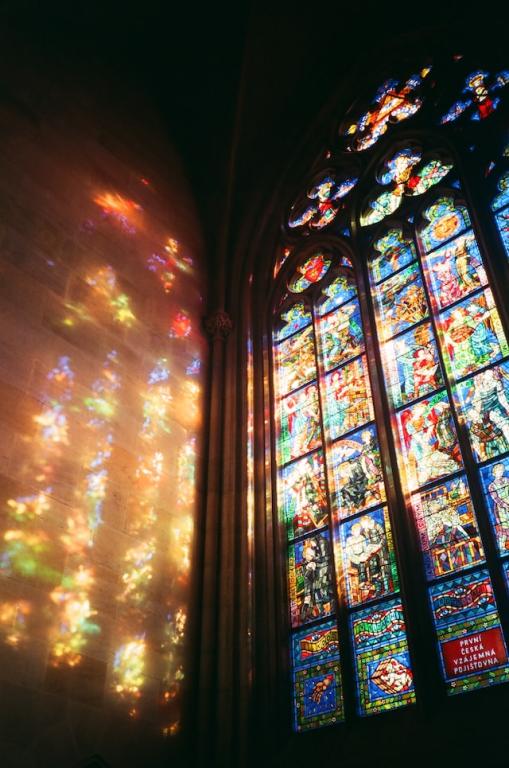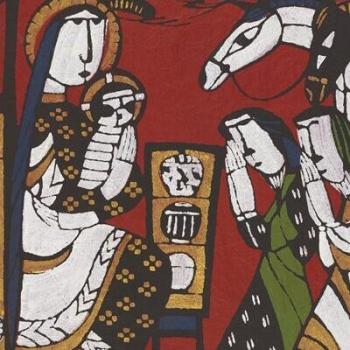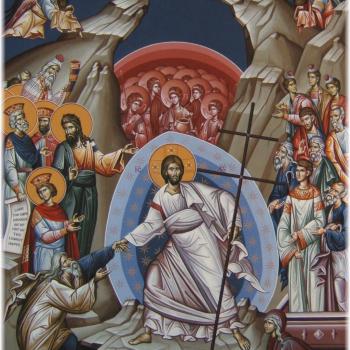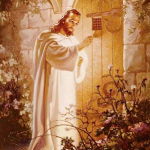Every Sunday in worship, we repeat these words from the Nicene Creed:
For us and for our salvation
he came down from heaven:
by the power of the Holy Spirit
he became incarnate from the Virgin Mary,
and was made man.
For us and for our salvation. Salvation. I look back over the thousands of times that I have heard people use that word – that bit of stained-glass language – and I wonder, do we even know what salvation is
I suspect that most of us think it is exclusively SALVATION FROM things. Salvation FROM sin. FROM the guilt that goes along with sin. And salvation FROM hell – that place of endless torment that comes as the price for failing to do what we ought to do.
It is a message that conjures up pictures of TV preachers pacing, sweating, and shouting, all the while having a series of affairs with church secretaries. It reminds us of macho non-denom pastors shouting and telling men to man-up. And it calls to mind pictures of Westboro Baptists, picketing church gatherings and veteran’s funerals with signs declaring, “God hates – well, pretty much everyone – except Westboro Baptists.”
They reach deep down inside people where their insecurities and fears lie hidden, and they twist that fear until people run looking for comfort. Once you take their message at face value, you are trapped. To raise doubts about the logic of what they preach is to prove that you are just the kind of sinner that they are talking about.
The logic of the SALVATION FROM narrative is so easy to spread, in fact, that it has created a second trend in the American church that is not much more than a reaction to it. Often labeled Progressive Protestantism, that version of the Christian faith holds that there is nothing wrong with us that can’t be solved with a bit of therapy and the right kind of politics. Much of it believes in a Jesus who is thoroughly human – a combination of Karl Marx and spirit-person. And the last thing anyone in that version of Christianity needs is to be saved FROM anything.
Thank God, the Nicene Creed, based upon the first three centuries of the church’s experience of the Resurrected Christ, is an antidote to both views of the Gospel:
For us and for our salvation
he came down from heaven:
by the power of the Holy Spirit
he became incarnate from the Virgin Mary,
and was made man.
Jesus does want to save us FROM some things. He wants to save us FROM putting ourselves at risk. FROM destroying ourselves. He also wants to save us FROM hurting and destroying one another. In a word, he wants to save us FROM the power of sin and the death that it brings in all its forms, both small and final.
Hell isn’t a destination. It’s our own creation. It’s the consequence of choices we make when we behave as if there is no God. And when we act as if there is no God, we don’t need to wait for hell. It dogs us in the hear and now.
Greed consumes us from the beginning it takes hold in our hearts. Lust overwhelms us from the moment we open the door to it. Hatred and envy poisons our relationships the moment we allow it to define our attitudes toward one another.
God wants to save us from that destructive power, and he wants to save us from its consequences. Sin is its own punishment, a chain forged one link at a time.
But what Fundamentalism misses and Progressive Protestantism fails to understand is that SALVATION FROM the consequences of sin is not delivered by a God who stands at a distance from us. SALVATION FROM the power of sin and death is something that God longs to protect us from by coming alongside of us – offering us forgiveness, mercy, and restoration.
The other thing that both Fundamentalism and Progressive Protestantism misses is the fact that God also saves us FOR NEW LIFE not just FROM SIN. This is the affirmation of the Creed and the heart of the Gospel. We are SAVED FOR lives marked by meaning, freedom, joy, fulfillment, and peace. And that new life is given to us with the promise of intimacy with God, as well as the strength, wisdom, and direction needed to live that life. Put another way – we are healed and made whole.
Everywhere the Christian turns, there is new reason to rejoice in the saving power of God. Meaning arises from the conviction that God has made us, that we have a purpose, and that God’s purpose for us cannot be frustrated. Spend any time with the personal, moral, and social challenges that we face, and one gets a good sense of how that conviction can ground us. Far from running from the world, Christians are able to confront the chaos and confusion of it and live in ways that suggest a way forward. Reassured of the promise that God offers us new life, we can confront out own failings and weaknesses with the confidence that God will give us strength. Even in moments of weakness, we are reminded that in Christ we remain strong. So, no moment – no matter how difficult – can overwhelm the work that God does in and through us.
How is this possible?
As the Creed observes, being SAVED FROM SIN and FOR NEW LIFE is made possible in the Incarnation: Christ’s presence among us in human flesh. And the Incarnation makes this possible in two ways: In Jesus the image of God is restored in human flesh and in living out that life, Jesus completes and models that path through his life, death, resurrection, and ascension.
In other words, Jesus paves the way, provides the way, and shows the way. This is why we are in church every Sunday. This is why we receive Christ’s body and blood each week. This is why we read the Gospel, over and over again. This is why, through the course of the week, we return – again and again – to the strength that experience provides. In word, sacrament, and actions we participate in the life of Jesus.
We are invited to know the mind of Christ and his heart. We are invited to lay down our fear and live with his courage – to revel in the love that he has for us and to embrace others in that love. We are offered lives of enduring significance that cannot be touched by illness or death, because we participate in his work in the world.
Why this is necessary, why it could not be accomplished with a few words, and why the need for salvation could not have been avoided completely is something no human being can adequately explain. That is part of the reason that the church has long described the Incarnation as a mystery. It can be understood – to a point. But because it is the work of God, a full understanding of it is beyond our ability to grasp. But there are a few things that we can say:
One, our need to be saved FROM AND FOR is written into our nature as human beings. We are made in the image of God and to participate in the image of God is to be free. Without freedom we would not be capable of love and relationship. We would be robots or mindless machines.
But implicit in the freedom to choose God and choose the good is the freedom to not choose them – and therein lies the need for salvation. All too often in our own immaturity and willfulness, we prefer to be our own gods. So, if we wonder why we need saving, that – in large part – is why.
From that realization flows three reasons that help to explain why the incarnation is necessary:
We are not capable of delivering ourselves.
The Apostle Paul spoke for all of us when he told the church in Rome: “the good thing I want to do, I never do; the evil thing which I do not want — that is what I do” (Ro 7:19). People are not basically good. That does not mean that we are unloved or unlovable. It does not mean that are without value in God’s sight.
But it does underline our need for a power greater than our own. In an important way, we are all in need of a twelve step program and the Incarnation is the ultimate intervention. It is God’s power made real on our behalf. But it is not offered at arm’s length. It comes alongside of us. And in the incarnation, Jesus embraces the good, the bad, and the ugly of human existence.
Because we are incapable of helping ourselves knowledge has never been, nor ever will be able to save us.
So, what God accomplishes in the Incarnation could never have been completed with golden tablets or a memo to the human race. Our own history makes that clear.
We have turned some of the most subtle secrets of nature into weapons of mass destruction. Some of the best educated individuals in human history and some of the most culturally advanced countries in human history have used their genius to murder millions and drag the world into war. And things are not changing. This is the age of information. It is in no danger of being the age of wisdom.
And there is this: None of us are capable of the sacrifice that Christ made in taking on human flesh.
It is not just that none of us would surrender our lives for untold billions we do not know. That would be hard enough. The other problem is that none of us occupy a place in the world or the cosmos from which that kind of healing is possible.
Only the one who made the world possesses the power to fully heal it. And that is why the Creed moves from affirming that God the Father is creator to the affirmation that in the Incarnation, God makes our salvation possible. The two are not separate and unrelated truths. They are deeply connected. Only the one who made us can deliver us.
As Dorothy Sayers puts it:
The incarnation means that for whatever reason God chose to let us fall . . . to suffer, to be subject to sorrows and death—he has nonetheless had the honesty and the courage to take his own medicine. . . . He can exact nothing from man that he has not exacted from himself. He himself has gone through the whole of human experience—from the trivial irritations of family life and the cramping restrictions of hard work and lack of money to the worst horrors of pain and humiliation, defeat, despair, and death. . . . He was born in poverty and . . . suffered infinite pain—all for us—and thought it well worth his while.[1]
Gracious God, lover of souls,
Renew your image in our lives,
Write anew the gift of love and grace,
Animate our hearts,
Enlighten our minds,
Teach us to forgive,
Lead us to care in ever deeper and wiser ways,
Fill us anew with freedom,
That we might be your children,
Renewed and strengthened by your hand.
This we ask in the name of the One who seeks and renews,
Who with you and the Holy Spirit reigns one God,
Now and forever,
Amen.
[1] Dorothy L. Sayers, “The Greatest Drama Ever Staged,” in Creed or Chaos? And Other Essays in Popular Theology, Hodder and Stoughton.
Photo by Jakub Pierożyński on Unsplash


















